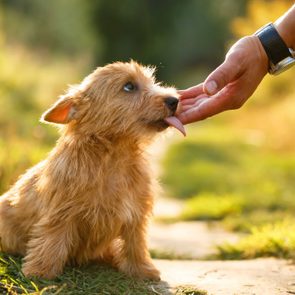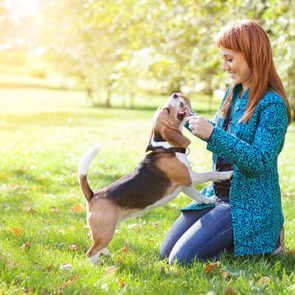Why Does My Dog Stare at Me? 9 Reasons Behind Your Dog Staring
Updated: May 31, 2024

Don't worry—your dog isn't staring at you to make you uncomfortable. It's just trying to communicate with you.
If you own a dog, you’ve no doubt been there: You’re eating lunch, and your dog’s eyes are following your movements. You’re brushing your teeth, and your dog is looking up at you. You’re watching TV, and your dog is watching you. You wouldn’t be alone in wondering, Why does my dog stare at me?
Dogs have been at our side for more than 10,000 years, becoming master observers of human behavior. Although being stared at by our pets can be uncomfortable, this behavior serves many practical—and usually harmless—purposes for our four-legged companions.
As a veterinarian, I am well versed in dog behavior and have extensive knowledge about why dogs do what they do. So let’s explore the reasons your dog may be staring at you and how this staring behavior is good for you both.
Get Reader’s Digest’s Read Up newsletter for more cleaning, humor, travel, tech and fun facts all week long.
Why does my dog stare at me?
Dogs can’t talk (although we sometimes wish they could), so they rely on their body language and facial expressions to communicate with us. When our dogs stare at us, they use their eyes to tell us something. It’s up to us to figure out what that something is and respond accordingly.
It’s getting to know you better

Over the thousands of years that dogs have been in our lives, they have not tired of observing us. When your dog stares at you, it’s trying to understand various things about you, like your habits, body language, facial expressions and tone of voice.
Your dog will also stare at you to gauge how you’re feeling. If you’re moping around the house, your dog will likely be able to pick up on that negative energy and possibly try to comfort you.
It’s telling you what it needs
Wouldn’t it be nice if our dogs could say, “I need to go to the bathroom” or “I’m hungry”? Since they can’t, they use their eyes to communicate these needs to us. For example, if your dog needs to pee, it might stand by the door and look at you to signal that it needs to go outside.
If your dog stares at you and licks its lips while you’re eating, it’s probably begging for food. Be careful with this type of stare, because giving your dog a tasty morsel of food will only reinforce the begging. Instead, encourage your pup to busy itself with another activity, such as a food puzzle toy, while you eat.
It’s expressing emotion
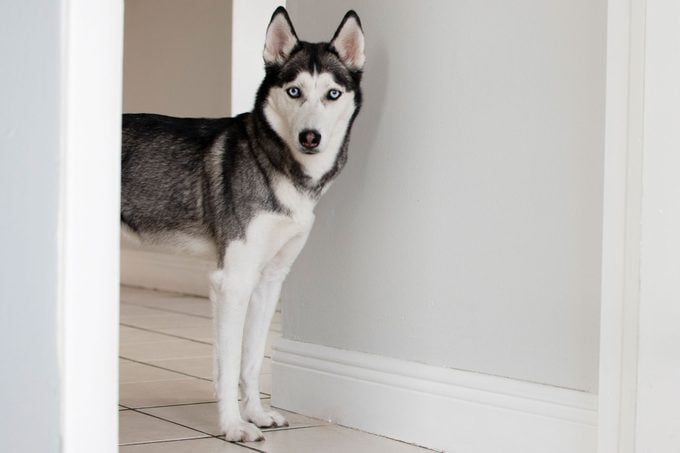
Love is one of the most powerful emotions our dogs can express to us through their eyes. A pup’s loving stare—the kind with slightly squinted eyes—will stimulate in its owner the release of oxytocin, the so-called love hormone. According to a study published in the journal Science, oxytocin strengthens the affectionate bond between you and your dog.
Dogs also stare to communicate aggression. An aggressive stare, accompanied by a stiff posture and unblinking eyes, tells you to back off. This type of stare, which you should not return, is often associated with resource guarding (for example, guarding dog toys) and signals a need for behavioral modification.
It wants attention
Quality time with our dogs is the highlight of our day—and theirs. If your dog is staring at you expectantly with a toy in its mouth, it’s urging you to give it attention and play with it.
If your dog shares your bed, it may stare at you to express a desire for some cuddle time before dozing off into dreamland.
It’s confused
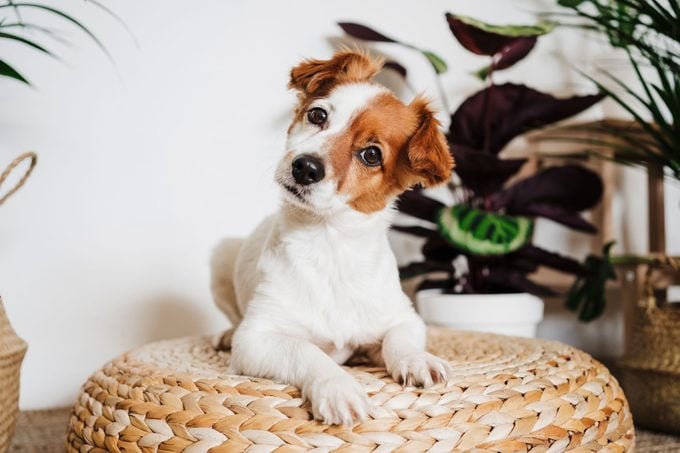
Quite literally, our dogs look to us for instruction. If your dog does not understand your command or is in an unfamiliar situation, it will stare at you for clarity on what to do.
Let’s say that you’re walking your dog and come to a crosswalk. Your dog might stare up at you, waiting for you to tell it when it’s safe to cross the street.
It’s pooping
Dogs have some odd bathroom habits. (Spinning before pooping, anyone?) You may have also noticed your dog staring at you when it poops, and there’s a reason for that. Squatting to poop puts your dog in a vulnerable position, so it’ll stare at you for reassurance that you will protect it while it’s doing its business. Be a good protector by scanning the area for potential dangers, such as another dog.
It’s sick or injured
Dogs depend on us to take good care of them. If your dog is injured or not feeling well, staring at you is its way of telling you that something is wrong and it needs your help. If your dog is acting out of the ordinary—say, being less active or acting extra clingy—it may be time for a trip to the vet.
It’s experiencing separation anxiety
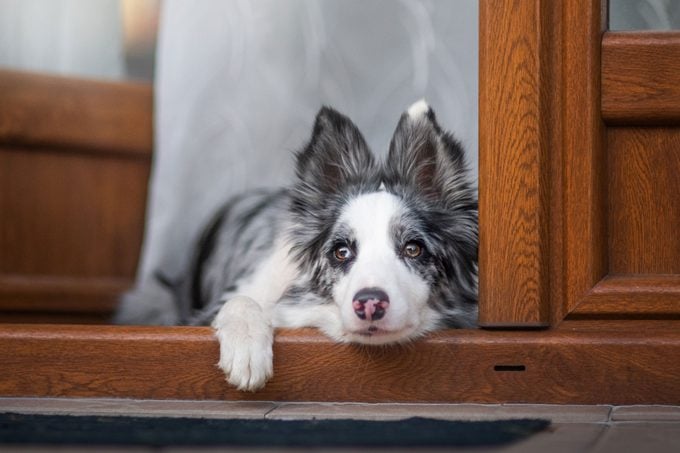
If your dog follows you everywhere and staring at you to ask for attention, it may be experiencing separation anxiety. Left unchecked, this can lead to destructive behavior and can negatively affect your dog’s physical health, causing issues such as vomiting and diarrhea.
If you suspect your dog has separation anxiety, talk to your veterinarian, who can refer you to a veterinary behaviorist. Severe cases of separation anxiety may require anti-anxiety medication in addition to behavioral modification.
Its brain function is declining
Older dogs can experience cognitive dysfunction, which is like human dementia. Signs of the disorder include confusion, anxiety, sleep disturbances and less interaction with owners, according to a study published in the journal Veterinary Clinics of North America, Small Animal Practice. Another red flag? Staring into space or at you.
If you have an older dog that is staring at you but doesn’t seem quite “there,” schedule a visit with your veterinarian for further examination.
Why it’s OK to make eye contact with your dog
“Why does my dog stare at me?” isn’t the only question you should be asking. Just as important is this: Why does human-canine eye contact matter?
Making eye contact with your dog helps you communicate with each other. Being able to interpret your dog’s stares will help you better understand what it needs and wants from you. Take, for instance, the process of training your dog. This is an ideal time for eye contact—your dog’s stare will indicate a need for instruction and reassurance as it learns new skills.
And let’s not forget the loving gaze! It helps strengthen the bond you share with your dog. As the researchers reported in the Science article, the oxytocin response between humans and dogs is a loop: When dogs stare at us, our level of the love hormone increases, which increases dogs’ oxytocin in turn.
Why trust us
At Reader’s Digest, we’re committed to producing high-quality content by writers with expertise and experience in their field in consultation with relevant, qualified experts. For this piece, JoAnna Pendergrass, DVM, tapped her experience as a veterinarian and journalist covering pets, and then Wailani Sung, MS, PhD, DVM, DACVB, a board-certified veterinary behaviorist who owns Bay Area Vet Behavior, gave it a rigorous review to ensure that all information is accurate and offers the best possible advice to readers. For this piece, we relied on reputable primary sources, including professional organizations and academic institutions, as well as our writer’s personal experience. We verified all facts and data and backed them with credible sourcing, and we will revisit them over time to ensure they remain accurate and up to date. Read more about our team, our contributors and our editorial policies.
Sources:
- Zoological Research: “Deciphering the puzzles of dog domestication”
- Science: “Oxytocin-gaze positive loop and the coevolution of human-dog bonds”
- Veterinary Clinics of North America, Small Animal Practice: “Canine Cognitive Dysfunction: Pathophysiology, Diagnosis, and Treatment”
- Journal of the American Veterinary Medical Association: “Review of epidemiological, pathological, genetic, and epigenetic factors that may contribute to the development of separation anxiety in dogs”





















